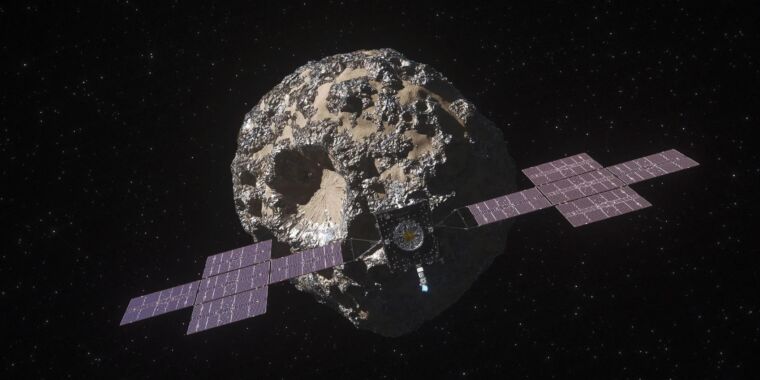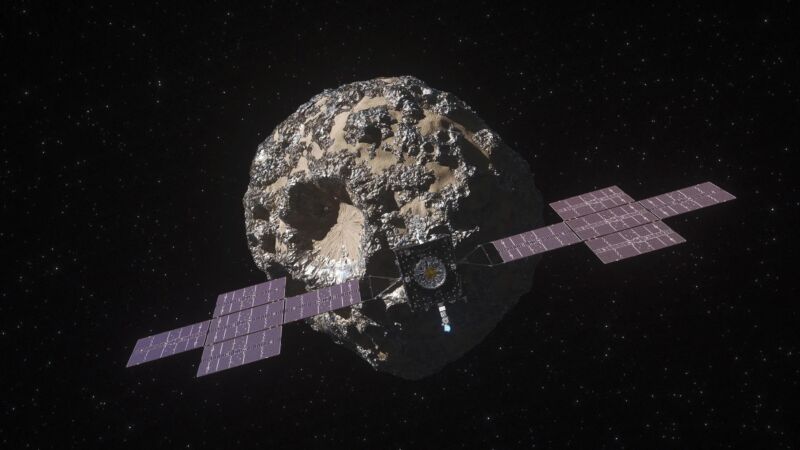In the race for space metals, companies hope to cash in

space truckin’ —
Mining asteroids could reduce the burden on Earth’s resources. Will it live up to its promise?

Enlarge / An illustration depicts a NASA spacecraft approaching the metal-rich asteroid Psyche. Though there are no plans to mine Psyche, such asteroids are being eyed for their valuable resources
In April 2023, a satellite the size of a microwave launched to space. Its goal: to get ready to mine asteroids. While the mission, courtesy of a company called AstroForge, ran into problems, it’s part of a new wave of would-be asteroid miners hoping to cash in on cosmic resources.
Potential applications of space-mined material abound: Asteroids contain metals like platinum and cobalt, which are used in electronics and electric vehicle batteries, respectively. Although there are plenty of these materials on Earth, they can be more concentrated on asteroids than mountainsides, making them easier to scrape out. And scraping in space, advocates say, could cut down on the damaging impacts that mining has on this planet. Space-resource advocates also want to explore the potential of other substances. What if space ice could be used for spacecraft and rocket propellant? Space dirt for housing structures for astronauts and radiation shielding?
Previous companies have rocketed toward similar goals before but went bust about a half-decade ago. In the years since that first cohort left the stage, though, “the field has exploded in interest,” said Angel Abbud-Madrid, director of the Center for Space Resources at the Colorado School of Mines.
A lot of the attention has focused on the Moon, since nations plan to set up outposts there and will need supplies. NASA, for instance, has ambitions to build astronaut base camps within the next decade. China, meanwhile, hopes to found an international lunar research station.
Still, the pull of space rocks remains powerful and the new crop of companies hopeful. The economic picture has improved with the cost of rocket launches decreasing, as has the regulatory environment, with countries creating laws specifically allowing space mining. But only time will tell if this decade’s prospectors will cash in where others have drilled into the red or be buried by their business plans.
An asteroid-mining company needs one major ingredient to get started: optimism. A hope that they could start a new industry, one not of this world. “Not a lot of humans are built to work like that,” said Matt Gialich, co-founder and CEO of AstroForge. Since the company’s April 2023 demo mission, it has yet to come close to mining anything.
What he and colleagues hope to extract, though, are platinum-group metals, some of which are used in devices like catalytic converters, which reduce gas emissions. Substances like platinum and iridium, meanwhile, are used in electronics. There are also opportunities in green technology, and new pushes to produce platinum-based batteries with better storage that could end up in electric vehicles and energy storage systems.
To further the company’s goals, AstroForge’s initial mission was loaded with simulated asteroid material and a refinery system designed to extract platinum from the simulant, to show that metal-processing could happen in space.
Things didn’t go exactly as planned. After the small craft got to orbit, it was hard to identify and communicate with among the dozens of other newly launched satellites. The solar panels, which provide the spacecraft with power, wouldn’t deploy at first. And the satellite was initially beset with a wobble that prevented communication. They have not been able to do the simulated extraction.
The company will soon embark on a second mission, with a different goal: to slingshot to an asteroid and take a picture — a surveying project which may help the company understand which valuable materials exist on a particular asteroid.
Another company, called TransAstra, is selling a telescope and software designed to detect objects like asteroids moving through the sky; Chinese corporation Origin Space has an asteroid-observing satellite in orbit around Earth, and is testing out its mining-relevant technology there. Meanwhile, Colorado company Karman+ plans to go straight to an asteroid in 2026 and test out excavation equipment.
To achieve the ultimate goal of pulling metals from space rocks, TransAstra, Karman+, and AstroForge have received a combined tens of millions of dollars in venture-capital funding to date.
Another company with similar aims, simply called Asteroid Mining Corporation Ltd., doesn’t want to rely much on outside investment in the long term. Such reliance, in fact, helped sink earlier companies. Instead, founder and CEO Mitch Hunter-Scullion is focusing his company’s early work on terrestrial applications that pay up immediately so he can fund future work in the broader universe. In 2021, the company partnered with Tohoku University Space Robotics Laboratory, based in Japan, to work on space robots.
Together, they have built a six-legged robot called the Space Capable Asteroid Robotic Explorer, or SCAR-E. Designed to operate in microgravity, it can crawl around a rugged surface and take data on, and samples of, what’s there. In 2026, the company plans to do a demonstration mission analyzing soil on the Moon.
For now, though, SCAR-E will stay on Earth and inspect ship hulls. According to one market research platform, this is a nearly $13 billion dollar market globally — as compared to the asteroid-mining market, currently $0, as no one has yet mined an asteroid.
Such grounded work may give the company a revenue stream before, and during, their time in space. “I think every asteroid-mining company has this realization that money runs out, investors get tired, and you have to do something,” said Hunter-Scullion.
“My opinion is that unless you’ve built something which makes sense on Earth,” he added, “you’re never going to be able to mine an asteroid.”


